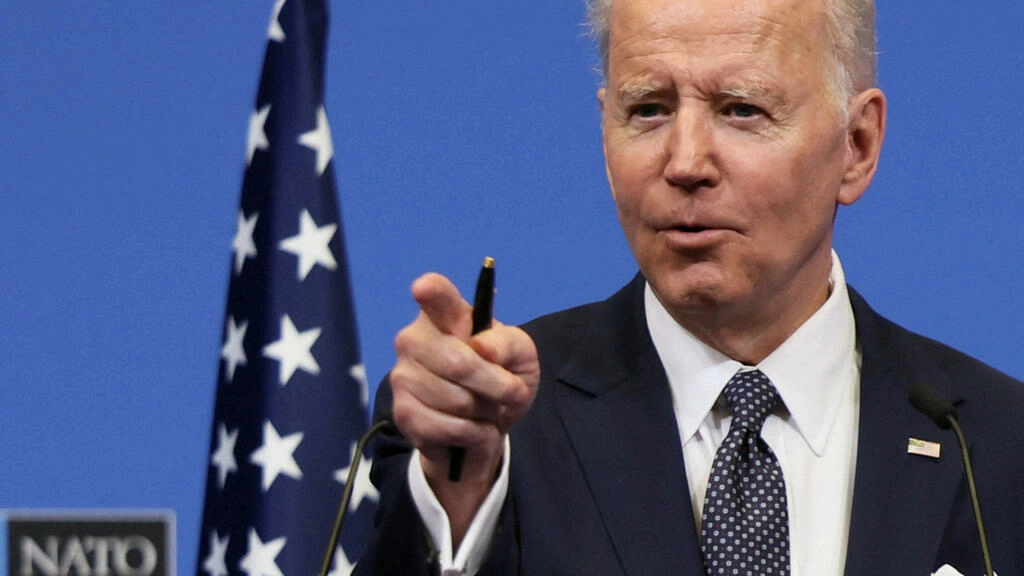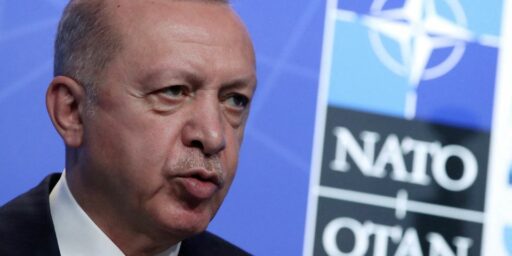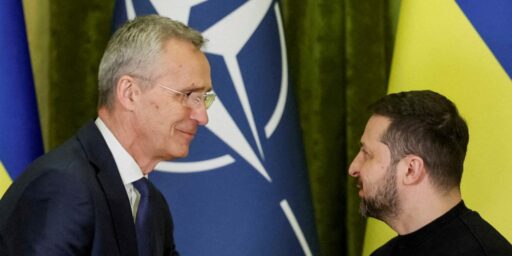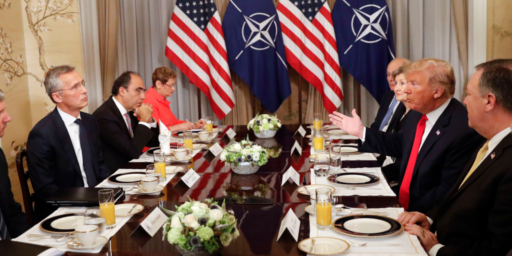Finland and Sweden Joining NATO
The Western alliance is getting stronger in the face of Russian aggression.

In the hoopla over Cassidy Hutchinson’s bombshell testimony yesterday, the news that Turkey has withdrawn its objection and NATO has formally invited Finland and Sweden to join the Alliance was overshadowed.
Reuters (“NATO invites Finland, Sweden to join, says Russia is a ‘direct threat’“):
NATO invited Sweden and Finland on Wednesday to join the military alliance in one of the biggest shifts in European security in decades after Russia’s invasion of Ukraine pushed Helsinki and Stockholm to drop their traditional of neutrality.
NATO’s 30 allies took the decision at their summit in Madrid and also agreed to formally treat Russia as the “most significant and direct threat to the allies’ security”, according to a summit statement.
“Today, we have decided to invite Finland and Sweden to become members of NATO,” NATO leaders said in their declaration, after Turkey lifted a veto on Finland and Sweden joining.
Ratification in allied parliaments is likely to take up to a year, but once it is done, Finland and Sweden will be covered by NATO’s Article 5 collective defence clause, putting them under the United States’ protective nuclear umbrella.
“We will make sure we are able to protect all allies, including Finland and Sweden,” Stoltenberg said.
In the meantime, the allies are set to increase their troop presence in the Nordic region, holding more military exercises and naval patrols in the Baltic Sea to reassure Sweden and Finland.
After four hours of talks in Madrid on Tuesday, Turkish President Tayyip Erdogan agreed with his Finnish and Swedish counterparts a series of security measures to allow the two Nordic countries to overcome the Turkish veto that Ankara imposed in May due to its concerns about terrorism.
It’s unclear what concessions Erdogan was able to wrangle. The NATO statement on the matter was anodyne even by diplomatic standards:
President Recep Tayyip Erdoğan of Türkiye, President Sauli Niinistö of Finland and Prime Minister Magdalena Andersson of Sweden met in Madrid on Tuesday (28 June 2022) under the auspices of NATO Secretary General Jens Stoltenberg. In that meeting, the leaders agreed a trilateral memorandum to address Türkiye’s legitimate security concerns, paving the way for Finland and Sweden’s NATO membership. The memorandum was signed by the foreign ministers of the three countries – Mevlüt Çavuşoğlu of Türkiye, Pekka Haavisto of Finland, and Ann Linde of Sweden – in the presence of all three national leaders, and the Secretary General.
Regardless, this is a big deal. While Sweden and Finland were part of the European security architecture for year, formally integrating them into the planning apparatus and extending the nuclear umbrellas matters. As does sending a powerful signal to Putin that his aggression has backfired in a big way.
“We are sending a strong message to (Russian President Vladimir) Putin: ‘you will not win’,” Spanish Prime Minister Pedro Sanchez said in a speech.
Allies also agreed on NATO’s first new strategic concept – its master planning document – in a decade. Russia, previously classed as a strategic partner of NATO,is now identified as NATO’s main threat.
Russia’s invasion of Ukraine is “a direct threat to our Western way of life,” Belgian Prime Minister Alexander de Croo added, citing the wider impact of the war, such as rising energy and food prices.
The planning document also cited China as a challenge for the first time, setting the stage for the 30 allies to plan to handle Beijing’s transformation from a benign trading partner to a fast-growing competitor from the Arctic to cyberspace.
Unlike Russia, whose war in Ukraine has raised serious concerns in the Baltics of an attack on NATO territory, China is not an adversary, NATO leaders said. But Stoltenberg has repeatedly called on Beijing to condemn Russia’s invasion of Ukraine, which Moscow says is a “special operation”.
I’m honestly skeptical that NATO would rally around the United States in a shooting war with China, given that the security interests of most members are simply not all that implicated. But formally acknowledging Putin’s increased menace, as well as the necessity to prepare to defend NATO interests in the Arctic, is useful.
Russia is achieving the opposite of what Putin sought when he launched his war in Ukraine in part to counter the expansion of NATO, Western leaders say.
Both Finland, which has a 1,300 km (810 mile) border with Russia, and Sweden, home of the founder of the Nobel Peace Prize, are now set to bring well-trained militaries into the NATO, aimed at giving the alliance Baltic Sea superiority.
“One of the most important messages from President Putin … was that he was against any further NATO enlargement,” Stoltenberg said on Tuesday evening. “He wanted less NATO. Now President Putin is getting more NATO on his borders.”
Indeed.






Both Sweden and Finland have significant, and growing, military strength, strategic locations with wrt/ Russia, and historic commitment to neutrality. Way to go Vlad!
This may not quite be Nixon to China, but it is huge. The Russian military that can’t take Ukraine now has NATO forces on a border stretching from St. Petersburg to Murmansk. It’s a defense disaster for them. The cost of defending an extra 800 miles of border is very heavy – that is a lot of jets, a lot of radars, a lot of missiles and men.
This, along with the quantum leap in NATO preparedness and German re-armament and the announced positioning of US forces in Poland makes the Baltics far more secure which in turn makes Kaliningrad less useful and far less secure. It makes Russian dominance of the arctic a bit more problematic.
I don’t see how Putin can polish this turd. Czar Vlad the Shirtless has made his country weaker, poorer, more isolated and less secure.
I put this on today’s forum so I’ll just link to it. I found this to be also important, a reassertion of our commitment to NATO.
https://www.outsidethebeltway.com/wednesdays-forum-105/#comment-2707251
If Mad Vlad was feeling encircled before…
As to China, regional alliances tend to be confined to a region. The US could invoke Article V if China attacked America, as they did after 9/11 when Al Qaida attacked. But not if China attacks Taiwan. For defense against that, there need be a different alliance.
If Trump gets re-elected, I doubt that the U.S. will remain in NATO.
Oh what the hell. If Trump gets re-elected, it will have demonstrated to me that America doesn’t deserve to exist any more and I might as well ghoulishly enjoy the ride down to oblivion.
@Michael Reynolds:
Speaking of the Arctic, we sometimes forget the world is round. And that Canada is a member of NATO.
Citing Threat From Russia, Canada Announces Major Investment In Air Defense
@Kathy:
It’s a pickle, because while the Europeans, the US, Canada, Australia and New Zealand all have long histories of military alliances and can be depended upon to honor an agreement, the Asians have no such history. Traditionally it has been every country for itself and the only way one country interacts with another is through subjugation. Other than that, they go their own way.
(If I’m wrong and there are counter examples, I would be very interested in hearing them. FWIW, I don’t consider the Chinese aid to be Vietnam or North Korea to be a counter example because at the time that aid was in purpose of a proxy for the larger battle against the West. And NK today is just a boil on China’s ass. Whatever treaties they have in place is merely window dressing on their need to keep NK from imploding and keep them from having to shoot the desperate and starving NK populace flooding across the continent.)
In the past, politics did actually stop at the shoreline, at least for the most part. But with the modern Republican Party, that is no longer true. Modern Republicans have no vision or even a significant strategy for anything, domestic or foreign. Of course, their patrons (billionaire hobbyists, the Murdochs, and similar) may have strategies, but those mostly focus on their immediate personal and business desires and have little to do with the US as a country. So Republicans view every interaction tactically, with everything being about favors begged or extorted to serve some trivial and immediate goal. “I’ve got a steel plant in my district and need a reduction in imports.” “Brown people are bad so I have to oppose education aid to South America.” “Biden is for a treaty with X so I have to be against it.” And of course, in Trump’s case it was significantly more venal than that. It is naive to think that Trump and 70% of his administration wasn’t just straight up selling favors to the highest bidders.
The last Republican President with a cohesive and realistic strategy was HW Bush. To contrast that, during Hillary Clinton’s time as SoS in the Obama administration, what her and her team accomplished in Asia was truly amazing. By the time W’s administration was over, it was accepted by nearly all countries that the US had lost interest there and all that could be done was to make the best accommodation with China. But the Obama administration turned that around and thwarted China’s efforts time after time. And there was no doubt who the Chinese held responsible: they barely disguised their hatred of Hillary. At one point there was an intra-Asian conference and China had made it clear that they would not negotiate collectively on territory, but rather each small country would have to deal with China alone and accept what China was willing to give them. And that had been the way for at least the previous decade. And then one by one, individually, country after country stood up and in their opening remarks talked about how territory was a regional issue and it must be dealt with together. The Obama administration had spent months quietly engaging in endless shuttle diplomacy, negotiating to achieve such a thing. China never saw it coming, and they were apoplectic (in a very Chinese way).
The Biden administration has picked up where Obama left off, and also achieved some astounding goals in Asia, particularly in thwarting the French accommodationist, “throw the weak out of the lifeboat” mentality.
@Scott:
Oh crum! And here I thought I was living on the edge (insert snarky emoji here). Just don’t plan on me filing for a name change.
Indeed, our quiet, frequently well behaved neighbor to the north is a key player. One which we frequently ignore.
@MarkedMan: Let me add the Iran agreement, the JCPOA. Something Obama and Hillary worked hard with the rest of the world to accomplish. Which Tom Cotton then opposed for his own political gain because Obama was for it, and which TFG unilaterally dumped for the same reason. Last I heard, since Trump showed the Iranians who’s boss their breakout time has dropped from close to a year to weeks.
@MarkedMan:
Yep.
When I was teaching business classes in China, I would talk about the metaphors for business in different countries (the US is a poker game). I avoided discussing the Chinese metaphor, because it’s “Who’s the best thief?” I’ve seen this in their political and international trade interactions, too. Everyone who deals with them knows this.
Add to this the almost narcissistic superiority complex that they have as a nation, and getting any of the smaller countries to enter into serious treaties with them is very difficult. Add to that all the inter-country bickering, and the fact that the US has been able to work with the smaller SE Asian countries and get them to band together is a testimony to some seriously strong political maneuvering.
Unless China attacked the US, Article 5 would not apply; and an attack on a third party would be outside NATO scope.
That’s why the US in the 1950’s envisaged a network of alliances of varying membership and scope: SEATO, CENTO aka METO aka Baghdad Pact, OAS (sort of).
In practice, the member states would be supportive; and likely the UK (and possibly France IMO, sceptics notwithstanding) would be active; if asked.
However, the main role for a stronger NATO in that scenario would be to block the obvious related gambit of a Sino-Russian alliance in connection to a crisis in East Asia.
That is, Russia threatens (but doesn’t act) in the Arctic; Russia actually acts in the Middle East.
If a Sino-Russian (and Iranian?) alignment can establish a position of strength that can dominate the Gulf, that potentially wrecks the US strategic position: threat to oil supply (to India and Japan for example). Also possible longer term threat to dollar position re. the petrocurrency cycle.
That is why booting Turkey from NATO is to be avoided if at all possible.
And why a “pivot to Asia” does not enable the US to shake itself loose from the Middle East or Europe.
At that scale the all Eurasia is interlinked.
Bah! Fickle edit function. 🙁
Incidentally, a friend emailed this gif as a wry comment on the change in German defence policy.
Germany defence budget now set to outstrip both the UK and France.
Major row over increasing defence spending brewing up in British government: Johnson is digging in his heels over further increases.
But Wallace at Defence has a lot of support on this issue in Parliament and in the wider security establishment.
Biden may not be the most effective communicator, which is a shame. However, despite the country being embroiled in a cloud of damaging avarice and theocratic incursions on the prospects of the American people, he is quietly engaging in some heavy lifting at home and around the world. He could do a lot more good if he had more votes in Congress and the liars and traitors on the Supreme Court were impeached and removed from their lifetime perches.